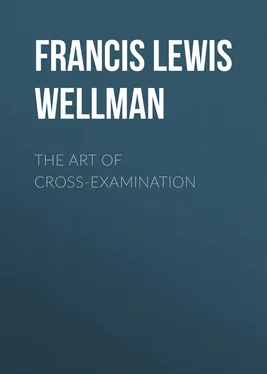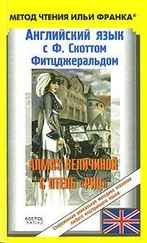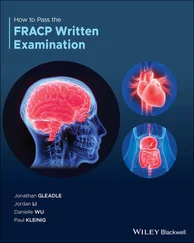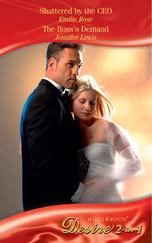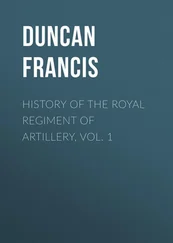Francis Lewis Wellman - The Art of Cross-Examination
Здесь есть возможность читать онлайн «Francis Lewis Wellman - The Art of Cross-Examination» — ознакомительный отрывок электронной книги совершенно бесплатно, а после прочтения отрывка купить полную версию. В некоторых случаях можно слушать аудио, скачать через торрент в формате fb2 и присутствует краткое содержание. Жанр: foreign_edu, Юриспруденция, на английском языке. Описание произведения, (предисловие) а так же отзывы посетителей доступны на портале библиотеки ЛибКат.
- Название:The Art of Cross-Examination
- Автор:
- Жанр:
- Год:неизвестен
- ISBN:нет данных
- Рейтинг книги:3 / 5. Голосов: 1
-
Избранное:Добавить в избранное
- Отзывы:
-
Ваша оценка:
- 60
- 1
- 2
- 3
- 4
- 5
The Art of Cross-Examination: краткое содержание, описание и аннотация
Предлагаем к чтению аннотацию, описание, краткое содержание или предисловие (зависит от того, что написал сам автор книги «The Art of Cross-Examination»). Если вы не нашли необходимую информацию о книге — напишите в комментариях, мы постараемся отыскать её.
The Art of Cross-Examination — читать онлайн ознакомительный отрывок
Ниже представлен текст книги, разбитый по страницам. Система сохранения места последней прочитанной страницы, позволяет с удобством читать онлайн бесплатно книгу «The Art of Cross-Examination», без необходимости каждый раз заново искать на чём Вы остановились. Поставьте закладку, и сможете в любой момент перейти на страницу, на которой закончили чтение.
Интервал:
Закладка:
Doctor. "They were microscopic hæmorrhages."
Counsel. "That is to say, one would have to take a microscope to find them?"
Doctor. "That is right."
Counsel. "You do not mean us to understand, doctor, that you have not cured him of these microscopic hæmorrhages?"
Doctor. "I have cured him; that is right."
Counsel. "You certainly were competent to set his broken leg or you wouldn't have attempted it; did you get a good union?"
Doctor. "Yes, he has got a good, strong, healthy leg."
Counsel having elicited, by the "smiling method," all the required admissions, suddenly changed his whole bearing toward the witness, and continued pointedly:—
Counsel. "And you said that $2500 would be a fair and reasonable charge for your services. It is three years since Mr. Metts was injured. Have you sent him no bill?"
Doctor. "Yes, sir, I have."
Counsel. "Let me see it. (Turning to plaintiff's counsel.) Will either of you let me have the bill?"
Doctor. "I haven't it, sir."
Counsel (astonished). "What was the amount of it?"
Doctor. "$1000."
Counsel (savagely). "Why do you charge the railroad company two and a half times as much as you charge the patient himself?"
Doctor (embarrassed at this sudden change on part of counsel). "You asked me what my services were worth."
Counsel. "Didn't you charge your patient the full worth of your services?"
Doctor (no answer).
Counsel (quickly). "How much have you been paid on your bill—on your oath?"
Doctor. "He paid me $100 at one time, that is, two years ago; and at two different times since he has paid me $30."
Counsel. "And he is a rich commission merchant down town!" (And with something between a sneer and a laugh counsel sat down.)
An amusing incident, leading to the exposure of a manifest fraud, occurred recently in another of the many damage suits brought against the Metropolitan Street Railway and growing out of a collision between two of the company's electric cars.
The plaintiff, a laboring man, had been thrown to the street pavement from the platform of the car by the force of the collision, and had dislocated his shoulder. He had testified in his own behalf that he had been permanently injured in so far as he had not been able to follow his usual employment for the reason that he could not raise his arm above a point parallel with his shoulder. Upon cross-examination the attorney for the railroad asked the witness a few sympathetic questions about his sufferings, and upon getting on a friendly basis with him asked him "to be good enough to show the jury the extreme limit to which he could raise his arm since the accident." The plaintiff slowly and with considerable difficulty raised his arm to the parallel of his shoulder. "Now, using the same arm, show the jury how high you could get it up before the accident," quietly continued the attorney; whereupon the witness extended his arm to its full height above his head, amid peals of laughter from the court and jury.
In a case of murder, to which the defence of insanity was set up, a medical witness called on behalf of the accused swore that in his opinion the accused, at the time he killed the deceased, was affected with a homicidal mania, and urged to the act by an irresistible impulse. The judge, not satisfied with this, first put the witness some questions on other subjects, and then asked, "Do you think the accused would have acted as he did if a policeman had been present?" to which the witness at once answered in the negative. Thereupon the judge remarked, "Your definition of an irresistible impulse must then be an impulse irresistible at all times except when a policeman is present."
CHAPTER IV
CROSS-EXAMINATION OF THE PERJURED WITNESS
In the preceding chapters it was attempted to offer a few suggestions, gathered from experience, for the proper handling of an honest witness who, through ignorance or partisanship, and more or less unintentionally, had testified to a mistaken state of facts injurious to our side of the litigation. In the present chapter it is proposed to discuss the far more difficult task of exposing, by the arts of cross-examination, the intentional Fraud, the perjured witness. Here it is that the greatest ingenuity of the trial lawyer is called into play; here rules help but little as compared with years of actual experience. What can be conceived more difficult in advocacy than the task of proving a witness, whom you may neither have seen nor heard of before he gives his testimony against you, to be a wilful perjurer, as it were out of his own mouth?
It seldom happens that a witness's entire testimony is false from beginning to end. Perhaps the greater part of it is true, and only the crucial part—the point, however, on which the whole case may turn—is wilfully false. If, at the end of his direct testimony, we conclude that the witness we have to cross-examine—to continue the imaginary trial we were conducting in the previous chapter—comes under this class, what means are we to employ to expose him to the jury?
Let us first be certain we are right in our estimate of him—that he intends perjury. Embarrassment is one of the emblems of perjury, but by no means always so. The novelty and difficulty of the situation—being called upon to testify before a room full of people, with lawyers on all sides ready to ridicule or abuse—often occasions embarrassment in witnesses of the highest integrity. Then again some people are constitutionally nervous and could be nothing else when testifying in open court. Let us be sure our witness is not of this type before we subject him to the particular form of torture we have in store for the perjurer.
Witnesses of a low grade of intelligence, when they testify falsely, usually display it in various ways: in the voice, in a certain vacant expression of the eyes, in a nervous twisting about in the witness chair, in an apparent effort to recall to mind the exact wording of their story, and especially in the use of language not suited to their station in life. On the other hand, there is something about the manner of an honest but ignorant witness that makes it at once manifest to an experienced lawyer that he is narrating only the things that he has actually seen and heard. The expression of the face changes with the narrative as he recalls the scene to his mind; he looks the examiner full in the face; his eye brightens as he recalls to mind the various incidents; he uses gestures natural to a man in his station of life, and suits them to the part of the story he is narrating, and he tells his tale in his own accustomed language.
If, however, the manner of the witness and the wording of his testimony bear all the earmarks of fabrication, it is often useful, as your first question, to ask him to repeat his story. Usually he will repeat it in almost identically the same words as before, showing he has learned it by heart. Of course it is possible, though not probable, that he has done this and still is telling the truth. Try him by taking him to the middle of his story, and from there jump him quickly to the beginning and then to the end of it. If he is speaking by rote rather than from recollection, he will be sure to succumb to this method. He has no facts with which to associate the wording of his story; he can only call it to mind as a whole, and not in detachments. Draw his attention to other facts entirely disassociated with the main story as told by himself. He will be entirely unprepared for these new inquiries, and will draw upon his imagination for answers. Distract his thoughts again to some new part of his main story and then suddenly, when his mind is upon another subject, return to those considerations to which you had first called his attention, and ask him the same questions a second time. He will again fall back upon his imagination and very likely will give a different answer from the first—and you have him in the net. He cannot invent answers as fast as you can invent questions, and at the same time remember his previous inventions correctly; he will not keep his answers all consistent with one another. He will soon become confused and, from that time on, will be at your mercy. Let him go as soon as you have made it apparent that he is not mistaken, but lying.
Читать дальшеИнтервал:
Закладка:
Похожие книги на «The Art of Cross-Examination»
Представляем Вашему вниманию похожие книги на «The Art of Cross-Examination» списком для выбора. Мы отобрали схожую по названию и смыслу литературу в надежде предоставить читателям больше вариантов отыскать новые, интересные, ещё непрочитанные произведения.
Обсуждение, отзывы о книге «The Art of Cross-Examination» и просто собственные мнения читателей. Оставьте ваши комментарии, напишите, что Вы думаете о произведении, его смысле или главных героях. Укажите что конкретно понравилось, а что нет, и почему Вы так считаете.
